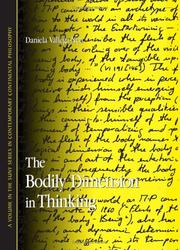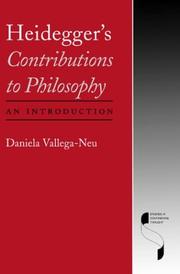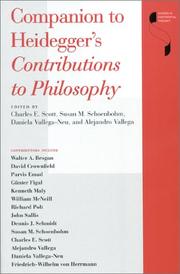| Listing 1 - 7 of 7 |
Sort by
|

ISBN: 079148274X 1423747844 9781423747840 0791465616 9780791465615 9780791482742 Year: 2005 Publisher: Albany : State University of New York Press,
Abstract | Keywords | Export | Availability | Bookmark
 Loading...
Loading...Choose an application
- Reference Manager
- EndNote
- RefWorks (Direct export to RefWorks)
Daniela Vallega-Neu questions the ontological meaning of body and thinking by carefully taking into account how we come to experience thought bodily. She engages six prominent figures of the Western philosophical tradition—Plato, Nietzsche, Scheler, Merleau-Ponty, Heidegger, and Foucault—and considers how they understand thinking to occur in relation to the body as well as how their thinking is itself bodily. Through a deconstructive and performative reading, she explores how their thinking reveals a bodily dimension that is prior to what classical metaphysics comes to conceive as mind-body duality. Thus, Vallega-Neu uncovers the bodily dimension that sustains their thought and their work. As she contends, the trace of the body in our thought not only exposes the strangers we are to ourselves, but may also lead to a new understanding of how we come to be who we are in relation to the world we live in.
Mind and body. --- Human body (Philosophy) --- Body and mind --- Body and soul (Philosophy) --- Human body --- Mind --- Mind-body connection --- Mind-body relations --- Mind-cure --- Somatopsychics --- Brain --- Dualism --- Philosophical anthropology --- Holistic medicine --- Mental healing --- Parousia (Philosophy) --- Phrenology --- Psychophysiology --- Self --- Body, Human (Philosophy) --- Philosophy --- Psychological aspects

ISBN: 1282072056 0253104165 0253109795 9786612072055 0203109791 9780203109793 9780253104168 9780253109798 0253342341 9780253342348 0253215994 9780253215994 0253342341 9780253342348 9781136536304 9781136536342 9781136536359 9781849775830 9781138680968 9781849712354 Year: 2003 Publisher: Bloomington, IN Indiana University Press
Abstract | Keywords | Export | Availability | Bookmark
 Loading...
Loading...Choose an application
- Reference Manager
- EndNote
- RefWorks (Direct export to RefWorks)
In her concise introduction to Contributions to Philosophy, Vallega-Neu provides guidance and structure to readers attempting to navigate this much-discussed but difficult text. In view of the centrality of Being and Time to Heidegger interpretation in recent decades, the author introduces Contributions first by reconsidering Being and Time in light of the transformative turn from prepositional thought to the poetic, performative character of thinking and language that markes the passage between the two works.
Philosophy. --- Mental philosophy --- Humanities --- Heidegger, Martin, --- Philosophy
Book
ISBN: 9780253033888 Year: 2018 Publisher: Bloomington Indiana University Press
Abstract | Keywords | Export | Availability | Bookmark
 Loading...
Loading...Choose an application
- Reference Manager
- EndNote
- RefWorks (Direct export to RefWorks)
Book
ISBN: 0253033896 025303390X 0253032148 9780253032140 9780253033918 0253033918 9780253032133 Year: 2018 Publisher: Bloomington, Indiana
Abstract | Keywords | Export | Availability | Bookmark
 Loading...
Loading...Choose an application
- Reference Manager
- EndNote
- RefWorks (Direct export to RefWorks)
Engaging the development of Heidegger's non-public writings on the event between 1936 and 1941, Daniela Vallega-Neu reveals what Heidegger's private writings kept hidden. Vallega-Neu takes readers on a journey through these volumes, which are not philosophical works in the traditional sense as they read more like fragments, collections of notes, reflections, and expositions. In them, Vallega-Neu sees Heidegger searching for a language that does not simply speak about being, but rather allows a sense of being to emerge in his thinking and saying. She focuses on striking shifts in the tone and movement of Heidegger's thinking during these important years. Skillfully navigating the unorthodox and intimate character of these writings, Vallega-Neu provides critical insights into questions of attunement, language, the body, and historicity in Heidegger's thinking.
Book
ISBN: 9780253001276 0253001277 9780253001139 0253001137 1280696613 9786613673572 Year: 2012 Publisher: Bloomington, IN : Indiana University Press,
Abstract | Keywords | Export | Availability | Bookmark
 Loading...
Loading...Choose an application
- Reference Manager
- EndNote
- RefWorks (Direct export to RefWorks)
Martin Heidegger's Contributions to Philosophy reflects his famous philosophical "turning." In this work, Heidegger returns to the question of being from its inception in Being and Time to a new questioning of being as event. Heidegger opens up the essential dimensions of his thinking on the historicality of being that underlies all of his later writings. Contributions was composed as a series of private ponderings that were not originally intended for publication. They are nonlinear and radically at odds with the traditional understanding of thinking. This translation presents Heidegger in pl.
Philosophy. --- Philosophie --- Philosophers. --- Philosophy -- History. --- Philosophy --- Philosophy & Religion --- History --- Mental philosophy --- Humanities

ISBN: 0253214653 0253339464 Year: 2001 Publisher: Bloomington, Ind. Indiana University Press
Abstract | Keywords | Export | Availability | Bookmark
 Loading...
Loading...Choose an application
- Reference Manager
- EndNote
- RefWorks (Direct export to RefWorks)
Companion to Heidegger's Contributions to PhilosophyEdited by Charles E. Scott, Susan Schoenbohm, Daniela Vallega-Neu, and Alejandro VallegaA key to unlocking one of Heidegger's most difficult and important works.The publication of the first English translation of Martin Heidegger's Beiträge zur Philosophie (Vom Ereignis) marked a significant event for Heidegger studies. Considered by scholars to be his most important work after Being and Time, Contributions to Philosophy
History of philosophy --- Heidegger, Martin --- Heidegger, Martin,
Digital

ISBN: 9783110774672 9783110774740 9783110774580 Year: 2024 Publisher: Berlin ;; Boston De Gruyter
Abstract | Keywords | Export | Availability | Bookmark
 Loading...
Loading...Choose an application
- Reference Manager
- EndNote
- RefWorks (Direct export to RefWorks)
| Listing 1 - 7 of 7 |
Sort by
|

 Search
Search Feedback
Feedback About UniCat
About UniCat  Help
Help News
News